Physical Activity: Minimizing Psychological Impact of Obesity
VerifiedAdded on 2023/06/16
|14
|2456
|149
Essay
AI Summary
This essay examines the significant medical and psychological issues related to childhood obesity, highlighting its potential long-term consequences such as diabetes, high blood pressure, and low self-esteem. It explores how physical activity can play a crucial role in mitigating these psychological imp...
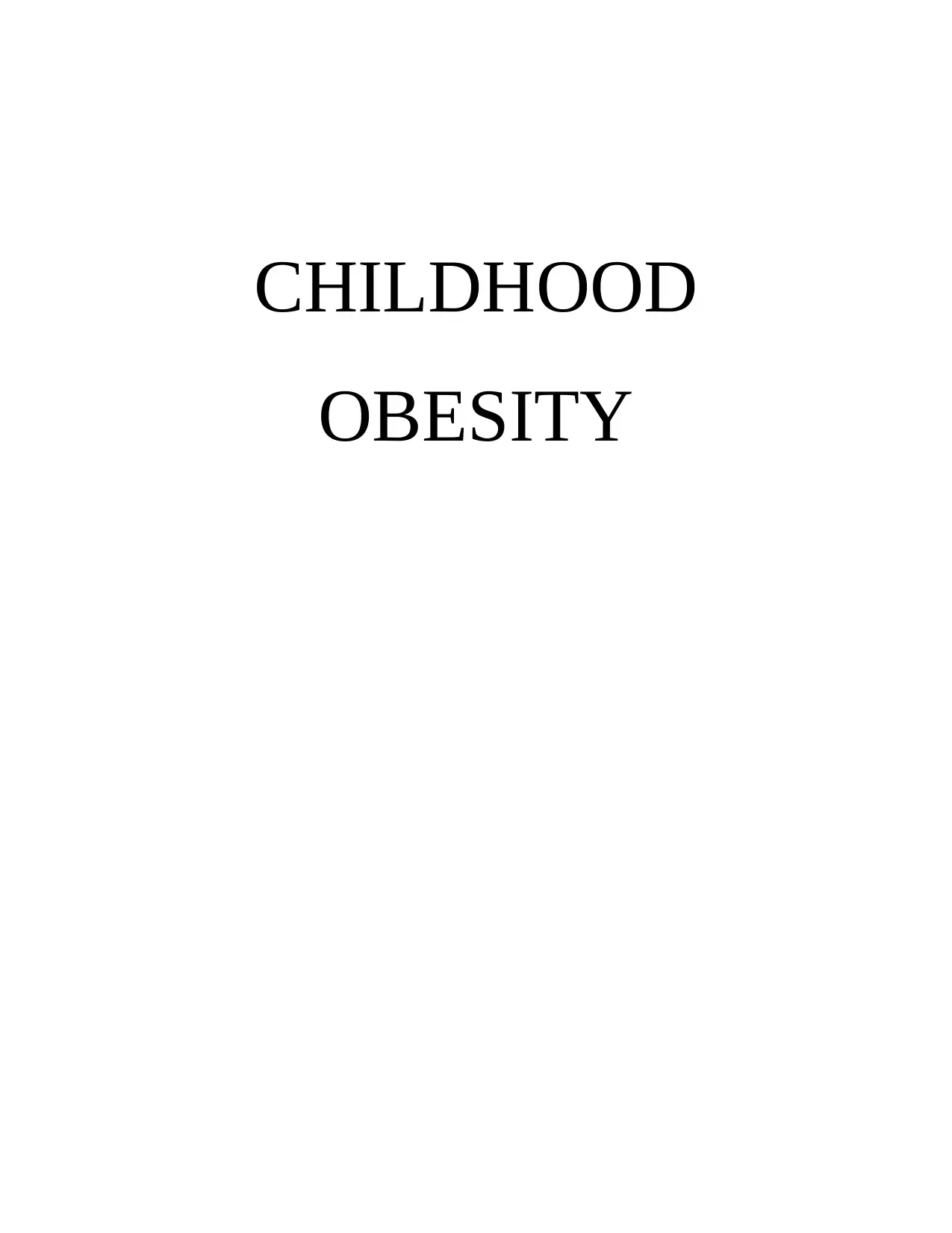
CHILDHOOD
OBESITY
OBESITY
Paraphrase This Document
Need a fresh take? Get an instant paraphrase of this document with our AI Paraphraser
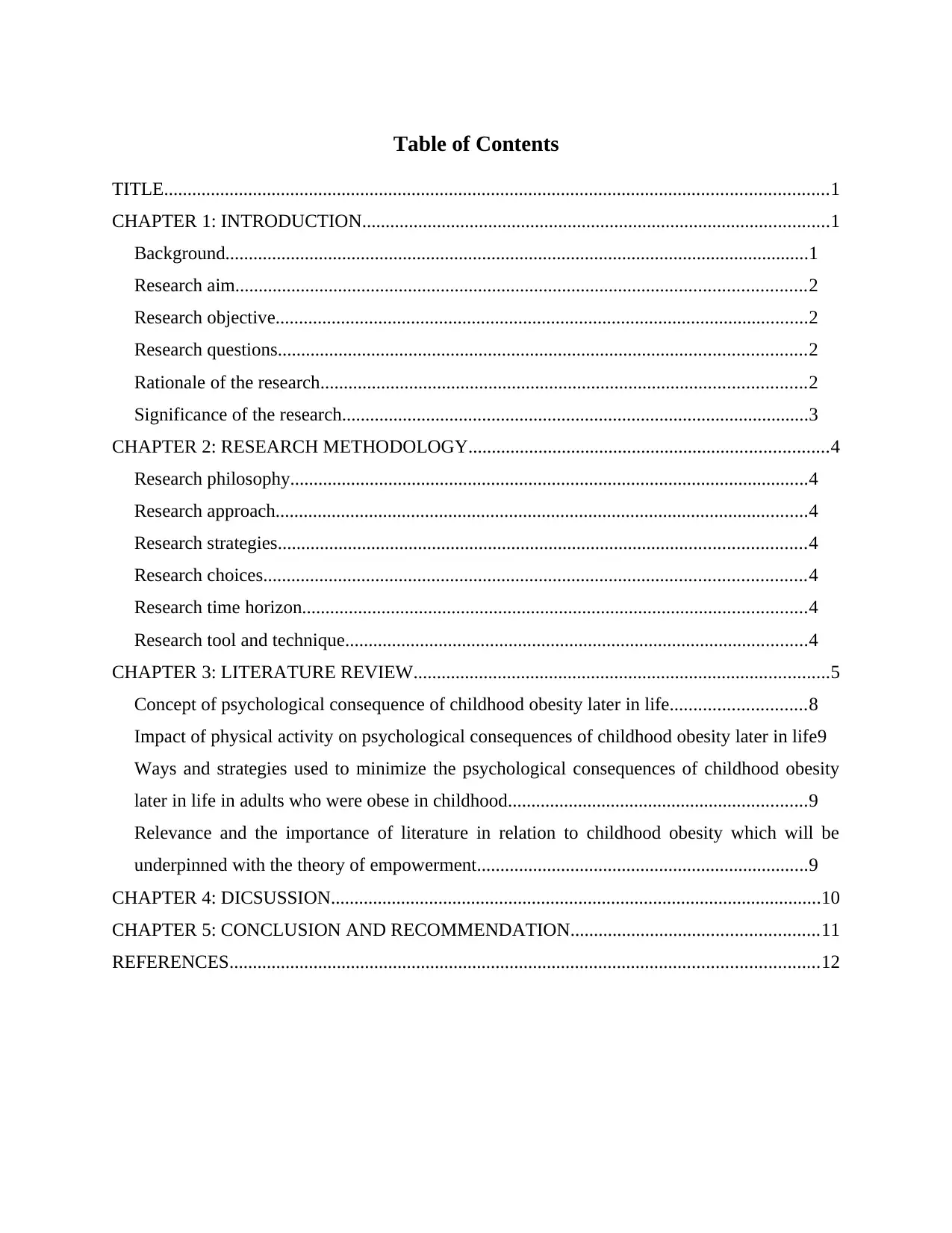
Table of Contents
TITLE..............................................................................................................................................1
CHAPTER 1: INTRODUCTION....................................................................................................1
Background.............................................................................................................................1
Research aim..........................................................................................................................2
Research objective..................................................................................................................2
Research questions.................................................................................................................2
Rationale of the research........................................................................................................2
Significance of the research....................................................................................................3
CHAPTER 2: RESEARCH METHODOLOGY.............................................................................4
Research philosophy...............................................................................................................4
Research approach..................................................................................................................4
Research strategies.................................................................................................................4
Research choices....................................................................................................................4
Research time horizon............................................................................................................4
Research tool and technique...................................................................................................4
CHAPTER 3: LITERATURE REVIEW.........................................................................................5
Concept of psychological consequence of childhood obesity later in life.............................8
Impact of physical activity on psychological consequences of childhood obesity later in life9
Ways and strategies used to minimize the psychological consequences of childhood obesity
later in life in adults who were obese in childhood................................................................9
Relevance and the importance of literature in relation to childhood obesity which will be
underpinned with the theory of empowerment.......................................................................9
CHAPTER 4: DICSUSSION.........................................................................................................10
CHAPTER 5: CONCLUSION AND RECOMMENDATION.....................................................11
REFERENCES..............................................................................................................................12
TITLE..............................................................................................................................................1
CHAPTER 1: INTRODUCTION....................................................................................................1
Background.............................................................................................................................1
Research aim..........................................................................................................................2
Research objective..................................................................................................................2
Research questions.................................................................................................................2
Rationale of the research........................................................................................................2
Significance of the research....................................................................................................3
CHAPTER 2: RESEARCH METHODOLOGY.............................................................................4
Research philosophy...............................................................................................................4
Research approach..................................................................................................................4
Research strategies.................................................................................................................4
Research choices....................................................................................................................4
Research time horizon............................................................................................................4
Research tool and technique...................................................................................................4
CHAPTER 3: LITERATURE REVIEW.........................................................................................5
Concept of psychological consequence of childhood obesity later in life.............................8
Impact of physical activity on psychological consequences of childhood obesity later in life9
Ways and strategies used to minimize the psychological consequences of childhood obesity
later in life in adults who were obese in childhood................................................................9
Relevance and the importance of literature in relation to childhood obesity which will be
underpinned with the theory of empowerment.......................................................................9
CHAPTER 4: DICSUSSION.........................................................................................................10
CHAPTER 5: CONCLUSION AND RECOMMENDATION.....................................................11
REFERENCES..............................................................................................................................12
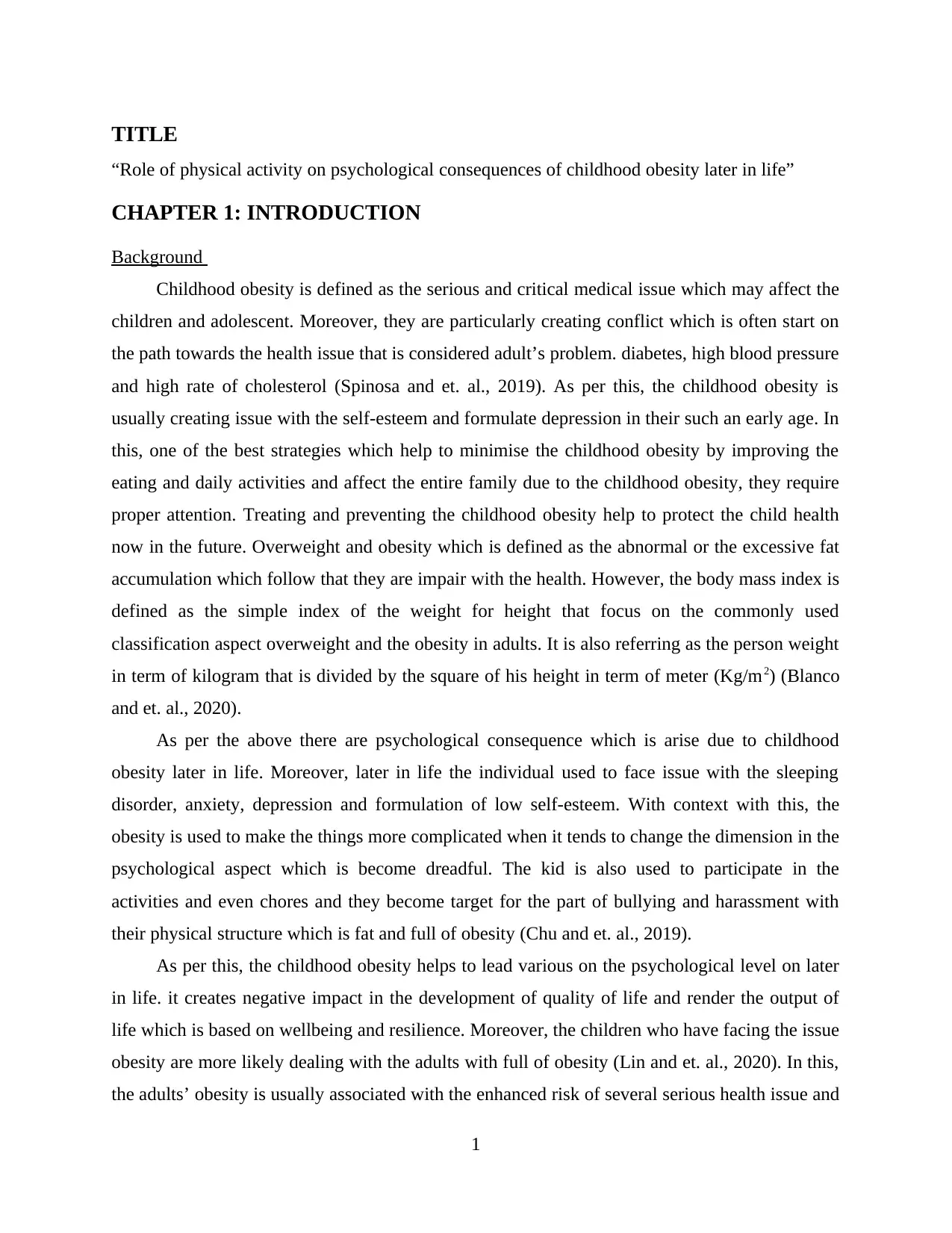
TITLE
“Role of physical activity on psychological consequences of childhood obesity later in life”
CHAPTER 1: INTRODUCTION
Background
Childhood obesity is defined as the serious and critical medical issue which may affect the
children and adolescent. Moreover, they are particularly creating conflict which is often start on
the path towards the health issue that is considered adult’s problem. diabetes, high blood pressure
and high rate of cholesterol (Spinosa and et. al., 2019). As per this, the childhood obesity is
usually creating issue with the self-esteem and formulate depression in their such an early age. In
this, one of the best strategies which help to minimise the childhood obesity by improving the
eating and daily activities and affect the entire family due to the childhood obesity, they require
proper attention. Treating and preventing the childhood obesity help to protect the child health
now in the future. Overweight and obesity which is defined as the abnormal or the excessive fat
accumulation which follow that they are impair with the health. However, the body mass index is
defined as the simple index of the weight for height that focus on the commonly used
classification aspect overweight and the obesity in adults. It is also referring as the person weight
in term of kilogram that is divided by the square of his height in term of meter (Kg/m2) (Blanco
and et. al., 2020).
As per the above there are psychological consequence which is arise due to childhood
obesity later in life. Moreover, later in life the individual used to face issue with the sleeping
disorder, anxiety, depression and formulation of low self-esteem. With context with this, the
obesity is used to make the things more complicated when it tends to change the dimension in the
psychological aspect which is become dreadful. The kid is also used to participate in the
activities and even chores and they become target for the part of bullying and harassment with
their physical structure which is fat and full of obesity (Chu and et. al., 2019).
As per this, the childhood obesity helps to lead various on the psychological level on later
in life. it creates negative impact in the development of quality of life and render the output of
life which is based on wellbeing and resilience. Moreover, the children who have facing the issue
obesity are more likely dealing with the adults with full of obesity (Lin and et. al., 2020). In this,
the adults’ obesity is usually associated with the enhanced risk of several serious health issue and
1
“Role of physical activity on psychological consequences of childhood obesity later in life”
CHAPTER 1: INTRODUCTION
Background
Childhood obesity is defined as the serious and critical medical issue which may affect the
children and adolescent. Moreover, they are particularly creating conflict which is often start on
the path towards the health issue that is considered adult’s problem. diabetes, high blood pressure
and high rate of cholesterol (Spinosa and et. al., 2019). As per this, the childhood obesity is
usually creating issue with the self-esteem and formulate depression in their such an early age. In
this, one of the best strategies which help to minimise the childhood obesity by improving the
eating and daily activities and affect the entire family due to the childhood obesity, they require
proper attention. Treating and preventing the childhood obesity help to protect the child health
now in the future. Overweight and obesity which is defined as the abnormal or the excessive fat
accumulation which follow that they are impair with the health. However, the body mass index is
defined as the simple index of the weight for height that focus on the commonly used
classification aspect overweight and the obesity in adults. It is also referring as the person weight
in term of kilogram that is divided by the square of his height in term of meter (Kg/m2) (Blanco
and et. al., 2020).
As per the above there are psychological consequence which is arise due to childhood
obesity later in life. Moreover, later in life the individual used to face issue with the sleeping
disorder, anxiety, depression and formulation of low self-esteem. With context with this, the
obesity is used to make the things more complicated when it tends to change the dimension in the
psychological aspect which is become dreadful. The kid is also used to participate in the
activities and even chores and they become target for the part of bullying and harassment with
their physical structure which is fat and full of obesity (Chu and et. al., 2019).
As per this, the childhood obesity helps to lead various on the psychological level on later
in life. it creates negative impact in the development of quality of life and render the output of
life which is based on wellbeing and resilience. Moreover, the children who have facing the issue
obesity are more likely dealing with the adults with full of obesity (Lin and et. al., 2020). In this,
the adults’ obesity is usually associated with the enhanced risk of several serious health issue and
1
⊘ This is a preview!⊘
Do you want full access?
Subscribe today to unlock all pages.

Trusted by 1+ million students worldwide
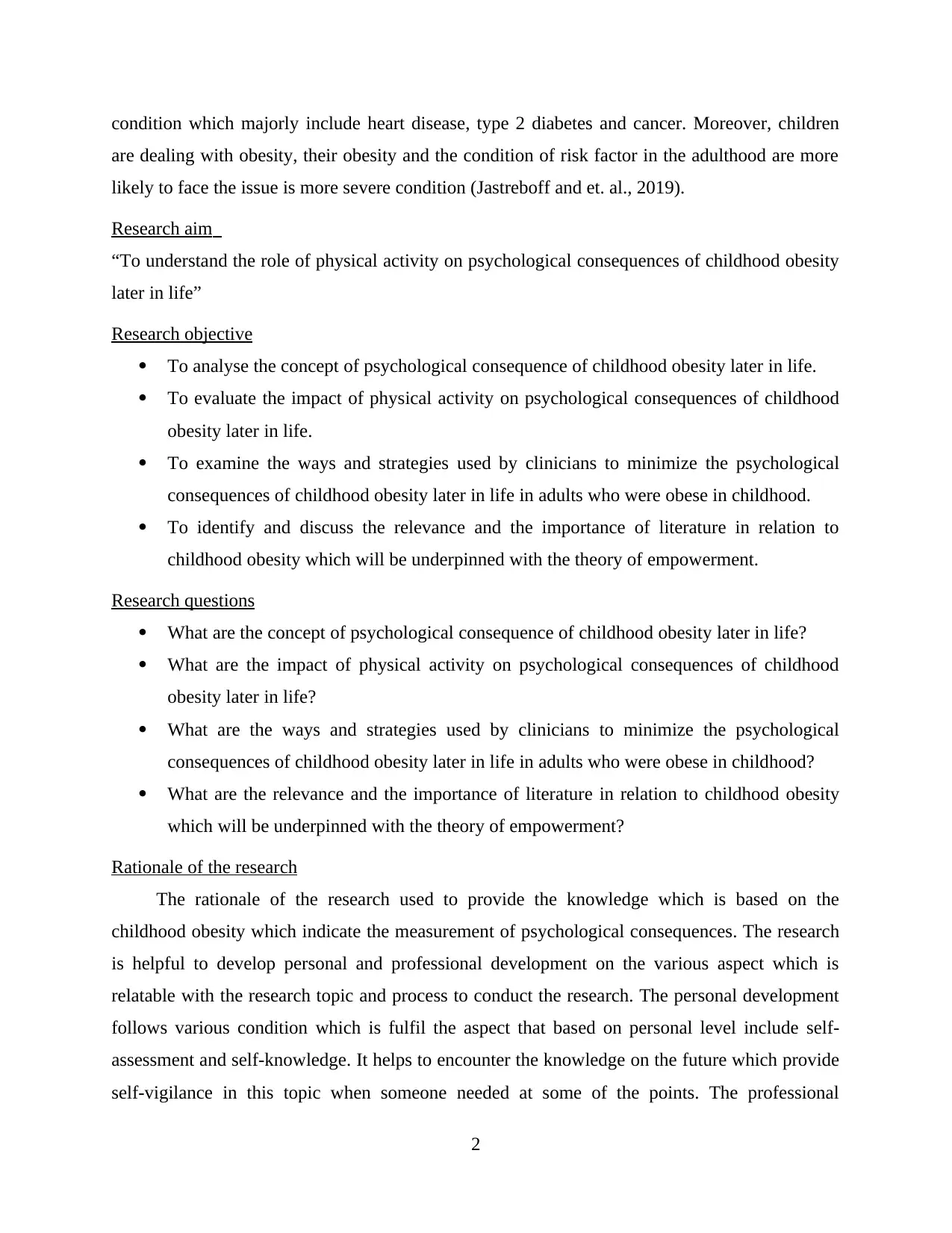
condition which majorly include heart disease, type 2 diabetes and cancer. Moreover, children
are dealing with obesity, their obesity and the condition of risk factor in the adulthood are more
likely to face the issue is more severe condition (Jastreboff and et. al., 2019).
Research aim
“To understand the role of physical activity on psychological consequences of childhood obesity
later in life”
Research objective
To analyse the concept of psychological consequence of childhood obesity later in life.
To evaluate the impact of physical activity on psychological consequences of childhood
obesity later in life.
To examine the ways and strategies used by clinicians to minimize the psychological
consequences of childhood obesity later in life in adults who were obese in childhood.
To identify and discuss the relevance and the importance of literature in relation to
childhood obesity which will be underpinned with the theory of empowerment.
Research questions
What are the concept of psychological consequence of childhood obesity later in life?
What are the impact of physical activity on psychological consequences of childhood
obesity later in life?
What are the ways and strategies used by clinicians to minimize the psychological
consequences of childhood obesity later in life in adults who were obese in childhood?
What are the relevance and the importance of literature in relation to childhood obesity
which will be underpinned with the theory of empowerment?
Rationale of the research
The rationale of the research used to provide the knowledge which is based on the
childhood obesity which indicate the measurement of psychological consequences. The research
is helpful to develop personal and professional development on the various aspect which is
relatable with the research topic and process to conduct the research. The personal development
follows various condition which is fulfil the aspect that based on personal level include self-
assessment and self-knowledge. It helps to encounter the knowledge on the future which provide
self-vigilance in this topic when someone needed at some of the points. The professional
2
are dealing with obesity, their obesity and the condition of risk factor in the adulthood are more
likely to face the issue is more severe condition (Jastreboff and et. al., 2019).
Research aim
“To understand the role of physical activity on psychological consequences of childhood obesity
later in life”
Research objective
To analyse the concept of psychological consequence of childhood obesity later in life.
To evaluate the impact of physical activity on psychological consequences of childhood
obesity later in life.
To examine the ways and strategies used by clinicians to minimize the psychological
consequences of childhood obesity later in life in adults who were obese in childhood.
To identify and discuss the relevance and the importance of literature in relation to
childhood obesity which will be underpinned with the theory of empowerment.
Research questions
What are the concept of psychological consequence of childhood obesity later in life?
What are the impact of physical activity on psychological consequences of childhood
obesity later in life?
What are the ways and strategies used by clinicians to minimize the psychological
consequences of childhood obesity later in life in adults who were obese in childhood?
What are the relevance and the importance of literature in relation to childhood obesity
which will be underpinned with the theory of empowerment?
Rationale of the research
The rationale of the research used to provide the knowledge which is based on the
childhood obesity which indicate the measurement of psychological consequences. The research
is helpful to develop personal and professional development on the various aspect which is
relatable with the research topic and process to conduct the research. The personal development
follows various condition which is fulfil the aspect that based on personal level include self-
assessment and self-knowledge. It helps to encounter the knowledge on the future which provide
self-vigilance in this topic when someone needed at some of the points. The professional
2
Paraphrase This Document
Need a fresh take? Get an instant paraphrase of this document with our AI Paraphraser
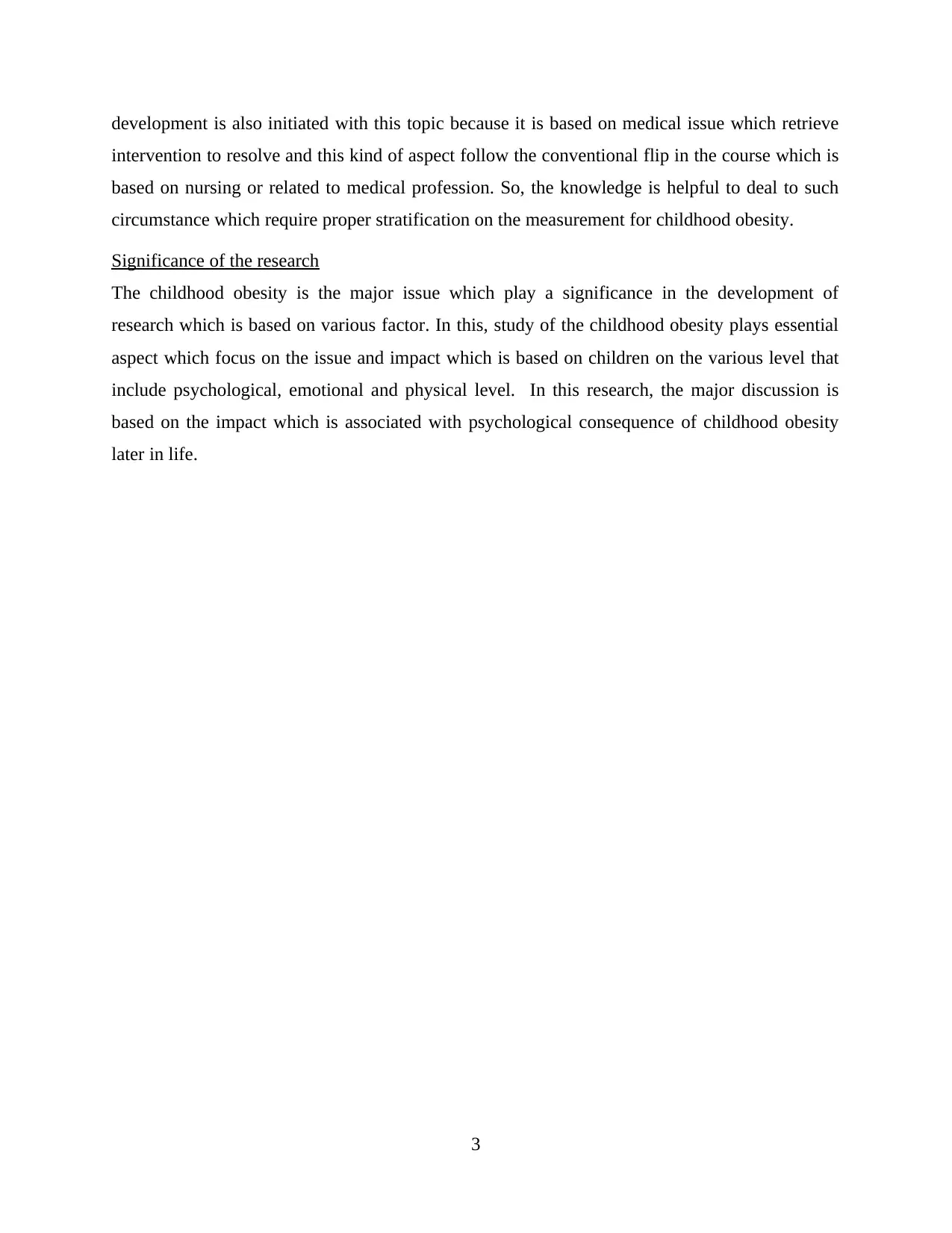
development is also initiated with this topic because it is based on medical issue which retrieve
intervention to resolve and this kind of aspect follow the conventional flip in the course which is
based on nursing or related to medical profession. So, the knowledge is helpful to deal to such
circumstance which require proper stratification on the measurement for childhood obesity.
Significance of the research
The childhood obesity is the major issue which play a significance in the development of
research which is based on various factor. In this, study of the childhood obesity plays essential
aspect which focus on the issue and impact which is based on children on the various level that
include psychological, emotional and physical level. In this research, the major discussion is
based on the impact which is associated with psychological consequence of childhood obesity
later in life.
3
intervention to resolve and this kind of aspect follow the conventional flip in the course which is
based on nursing or related to medical profession. So, the knowledge is helpful to deal to such
circumstance which require proper stratification on the measurement for childhood obesity.
Significance of the research
The childhood obesity is the major issue which play a significance in the development of
research which is based on various factor. In this, study of the childhood obesity plays essential
aspect which focus on the issue and impact which is based on children on the various level that
include psychological, emotional and physical level. In this research, the major discussion is
based on the impact which is associated with psychological consequence of childhood obesity
later in life.
3
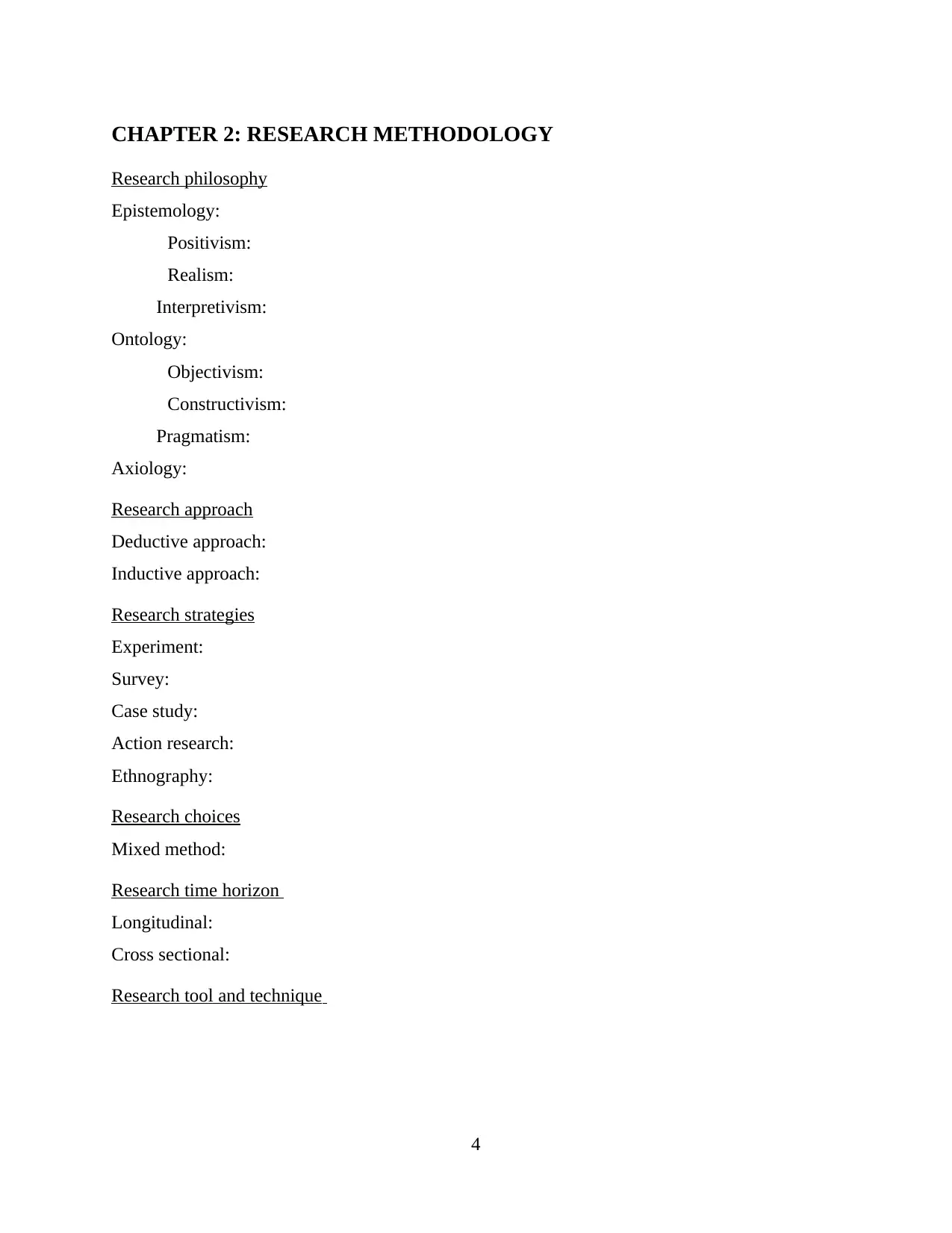
CHAPTER 2: RESEARCH METHODOLOGY
Research philosophy
Epistemology:
Positivism:
Realism:
Interpretivism:
Ontology:
Objectivism:
Constructivism:
Pragmatism:
Axiology:
Research approach
Deductive approach:
Inductive approach:
Research strategies
Experiment:
Survey:
Case study:
Action research:
Ethnography:
Research choices
Mixed method:
Research time horizon
Longitudinal:
Cross sectional:
Research tool and technique
4
Research philosophy
Epistemology:
Positivism:
Realism:
Interpretivism:
Ontology:
Objectivism:
Constructivism:
Pragmatism:
Axiology:
Research approach
Deductive approach:
Inductive approach:
Research strategies
Experiment:
Survey:
Case study:
Action research:
Ethnography:
Research choices
Mixed method:
Research time horizon
Longitudinal:
Cross sectional:
Research tool and technique
4
⊘ This is a preview!⊘
Do you want full access?
Subscribe today to unlock all pages.

Trusted by 1+ million students worldwide
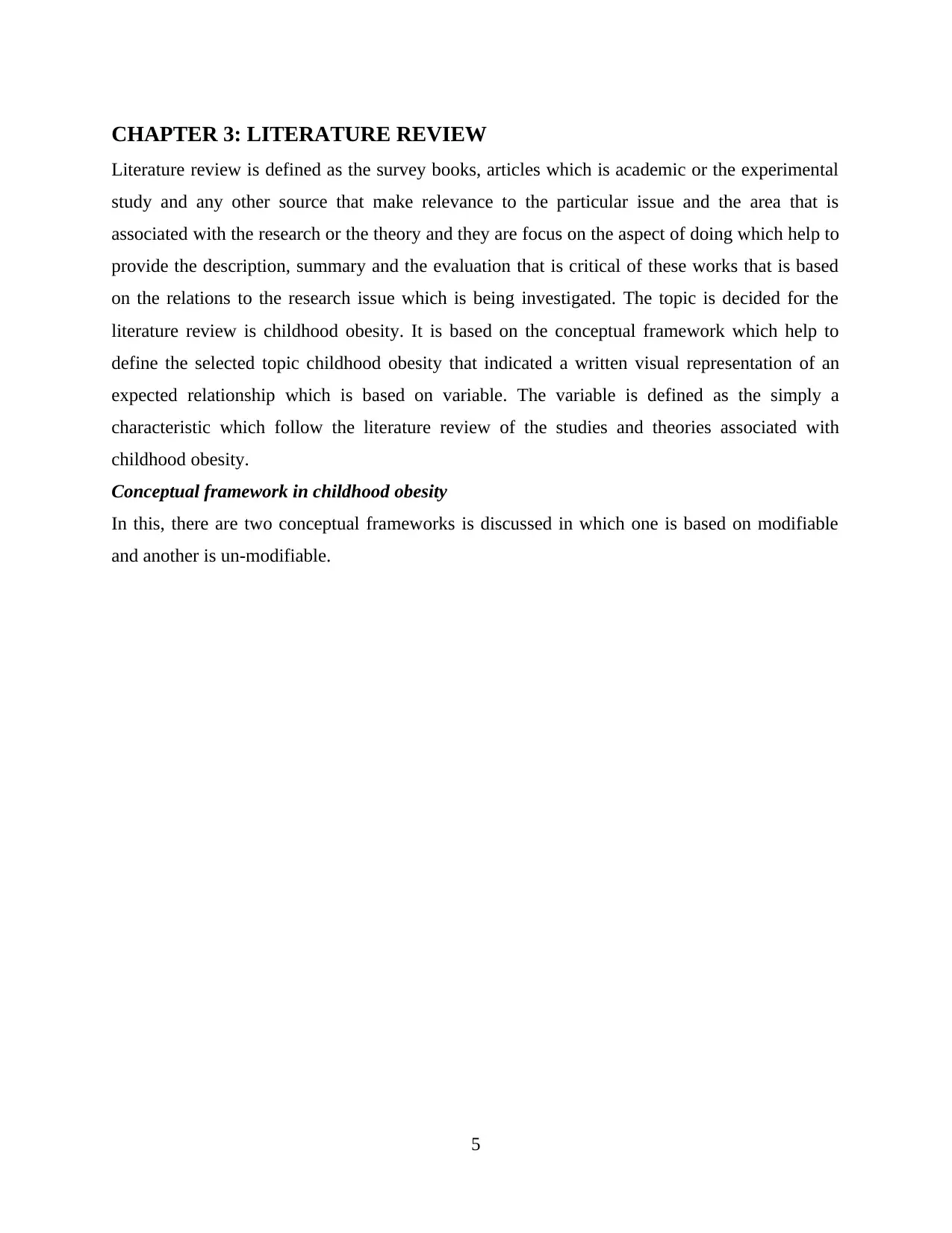
CHAPTER 3: LITERATURE REVIEW
Literature review is defined as the survey books, articles which is academic or the experimental
study and any other source that make relevance to the particular issue and the area that is
associated with the research or the theory and they are focus on the aspect of doing which help to
provide the description, summary and the evaluation that is critical of these works that is based
on the relations to the research issue which is being investigated. The topic is decided for the
literature review is childhood obesity. It is based on the conceptual framework which help to
define the selected topic childhood obesity that indicated a written visual representation of an
expected relationship which is based on variable. The variable is defined as the simply a
characteristic which follow the literature review of the studies and theories associated with
childhood obesity.
Conceptual framework in childhood obesity
In this, there are two conceptual frameworks is discussed in which one is based on modifiable
and another is un-modifiable.
5
Literature review is defined as the survey books, articles which is academic or the experimental
study and any other source that make relevance to the particular issue and the area that is
associated with the research or the theory and they are focus on the aspect of doing which help to
provide the description, summary and the evaluation that is critical of these works that is based
on the relations to the research issue which is being investigated. The topic is decided for the
literature review is childhood obesity. It is based on the conceptual framework which help to
define the selected topic childhood obesity that indicated a written visual representation of an
expected relationship which is based on variable. The variable is defined as the simply a
characteristic which follow the literature review of the studies and theories associated with
childhood obesity.
Conceptual framework in childhood obesity
In this, there are two conceptual frameworks is discussed in which one is based on modifiable
and another is un-modifiable.
5
Paraphrase This Document
Need a fresh take? Get an instant paraphrase of this document with our AI Paraphraser
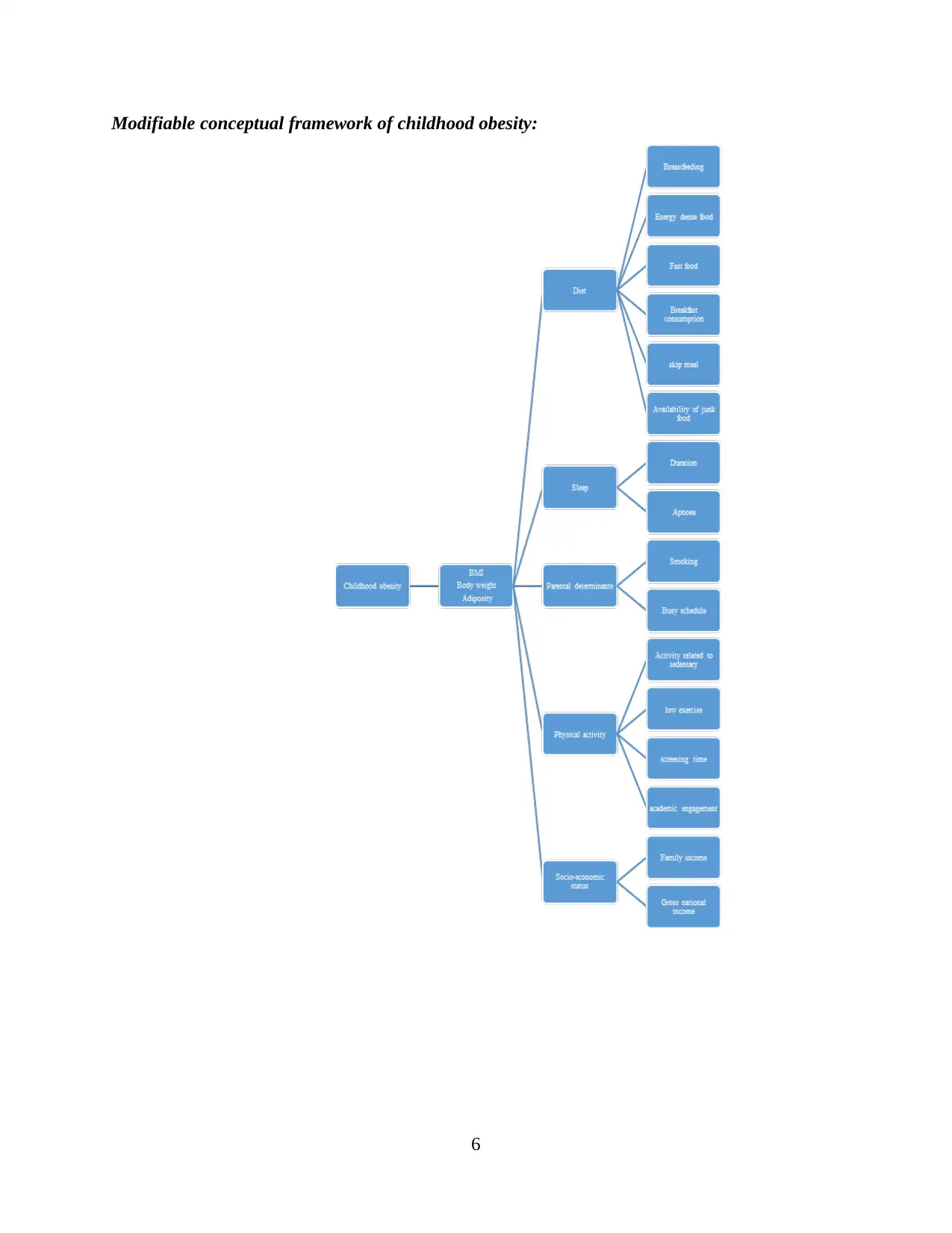
Modifiable conceptual framework of childhood obesity:
6
6
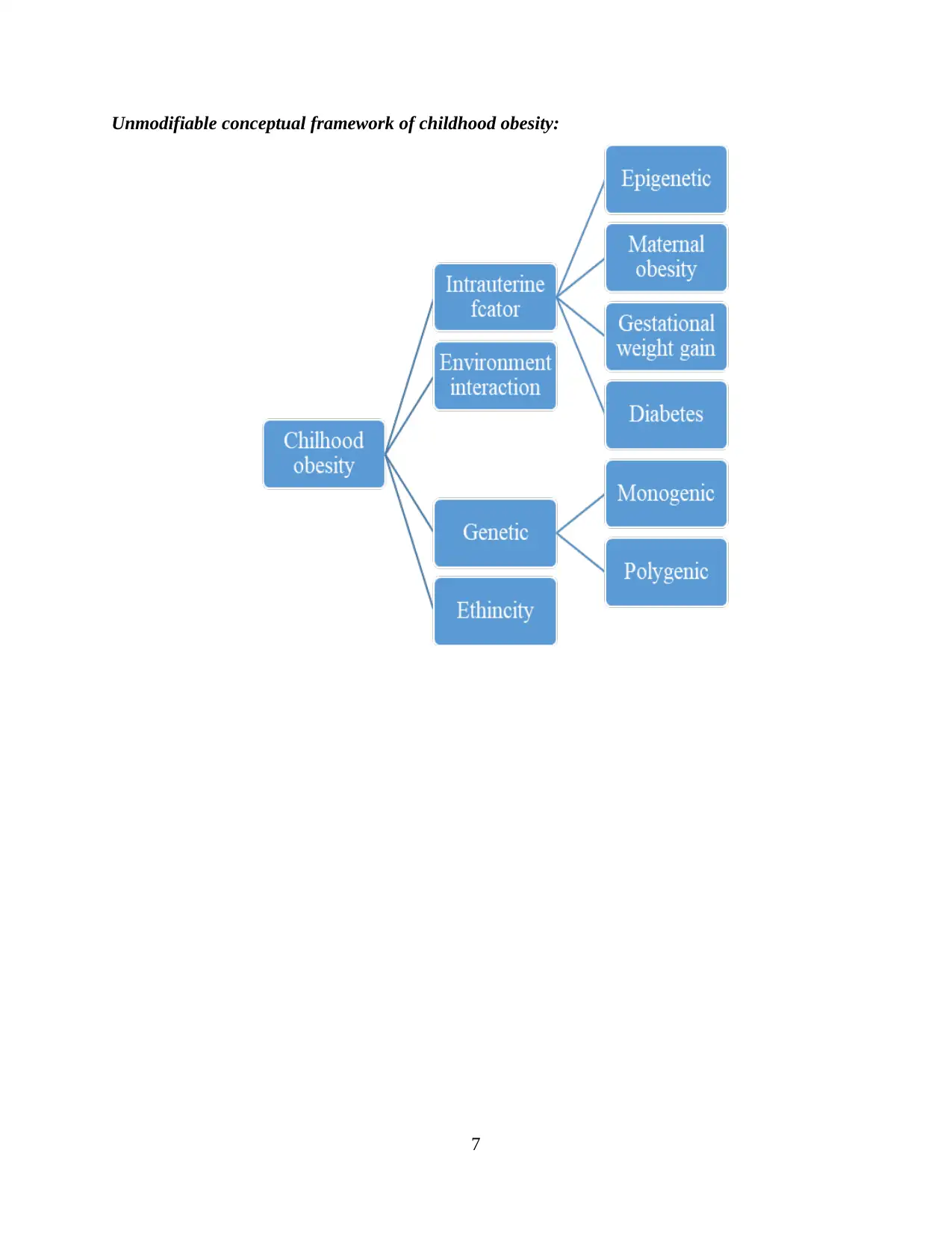
Unmodifiable conceptual framework of childhood obesity:
7
7
⊘ This is a preview!⊘
Do you want full access?
Subscribe today to unlock all pages.

Trusted by 1+ million students worldwide
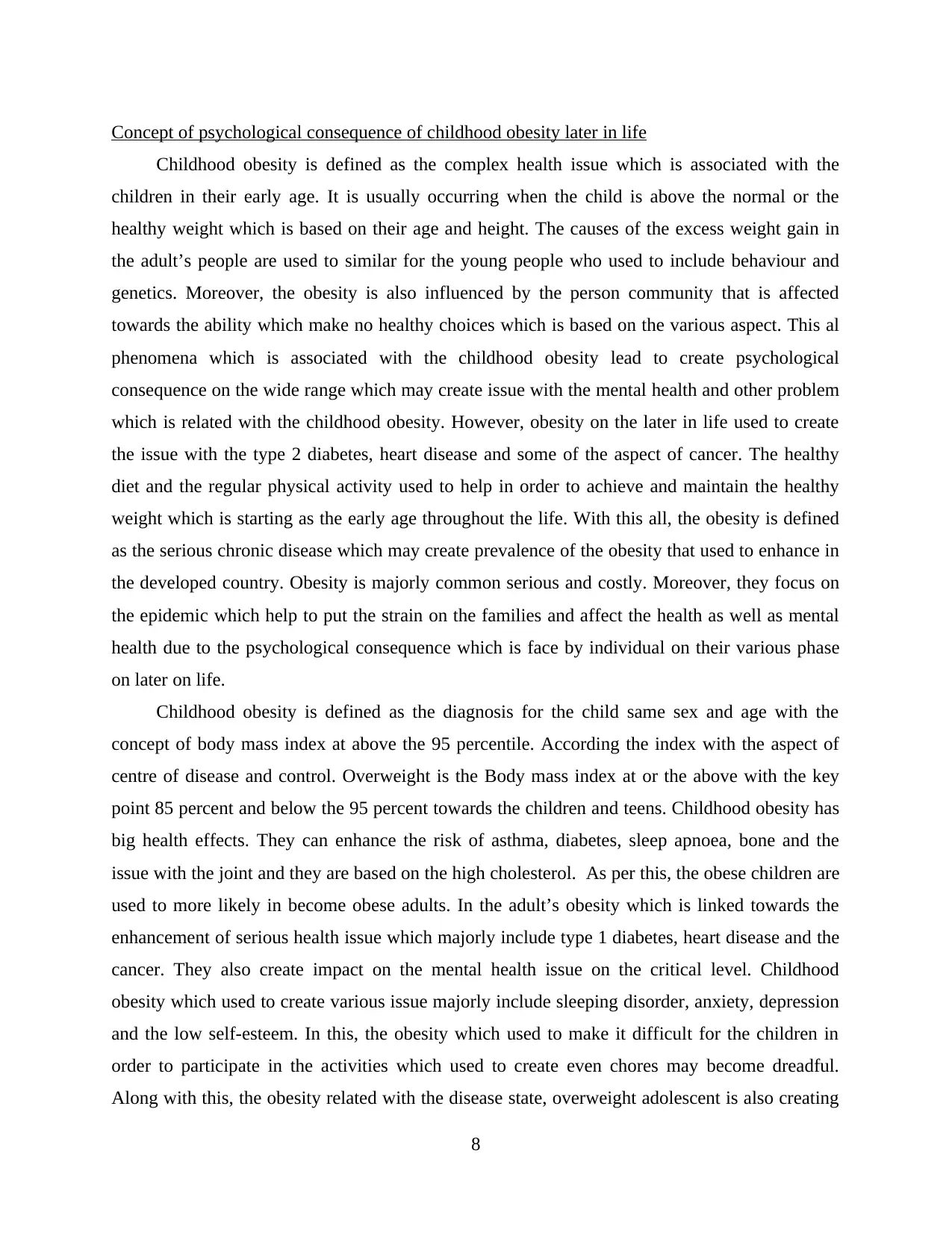
Concept of psychological consequence of childhood obesity later in life
Childhood obesity is defined as the complex health issue which is associated with the
children in their early age. It is usually occurring when the child is above the normal or the
healthy weight which is based on their age and height. The causes of the excess weight gain in
the adult’s people are used to similar for the young people who used to include behaviour and
genetics. Moreover, the obesity is also influenced by the person community that is affected
towards the ability which make no healthy choices which is based on the various aspect. This al
phenomena which is associated with the childhood obesity lead to create psychological
consequence on the wide range which may create issue with the mental health and other problem
which is related with the childhood obesity. However, obesity on the later in life used to create
the issue with the type 2 diabetes, heart disease and some of the aspect of cancer. The healthy
diet and the regular physical activity used to help in order to achieve and maintain the healthy
weight which is starting as the early age throughout the life. With this all, the obesity is defined
as the serious chronic disease which may create prevalence of the obesity that used to enhance in
the developed country. Obesity is majorly common serious and costly. Moreover, they focus on
the epidemic which help to put the strain on the families and affect the health as well as mental
health due to the psychological consequence which is face by individual on their various phase
on later on life.
Childhood obesity is defined as the diagnosis for the child same sex and age with the
concept of body mass index at above the 95 percentile. According the index with the aspect of
centre of disease and control. Overweight is the Body mass index at or the above with the key
point 85 percent and below the 95 percent towards the children and teens. Childhood obesity has
big health effects. They can enhance the risk of asthma, diabetes, sleep apnoea, bone and the
issue with the joint and they are based on the high cholesterol. As per this, the obese children are
used to more likely in become obese adults. In the adult’s obesity which is linked towards the
enhancement of serious health issue which majorly include type 1 diabetes, heart disease and the
cancer. They also create impact on the mental health issue on the critical level. Childhood
obesity which used to create various issue majorly include sleeping disorder, anxiety, depression
and the low self-esteem. In this, the obesity which used to make it difficult for the children in
order to participate in the activities which used to create even chores may become dreadful.
Along with this, the obesity related with the disease state, overweight adolescent is also creating
8
Childhood obesity is defined as the complex health issue which is associated with the
children in their early age. It is usually occurring when the child is above the normal or the
healthy weight which is based on their age and height. The causes of the excess weight gain in
the adult’s people are used to similar for the young people who used to include behaviour and
genetics. Moreover, the obesity is also influenced by the person community that is affected
towards the ability which make no healthy choices which is based on the various aspect. This al
phenomena which is associated with the childhood obesity lead to create psychological
consequence on the wide range which may create issue with the mental health and other problem
which is related with the childhood obesity. However, obesity on the later in life used to create
the issue with the type 2 diabetes, heart disease and some of the aspect of cancer. The healthy
diet and the regular physical activity used to help in order to achieve and maintain the healthy
weight which is starting as the early age throughout the life. With this all, the obesity is defined
as the serious chronic disease which may create prevalence of the obesity that used to enhance in
the developed country. Obesity is majorly common serious and costly. Moreover, they focus on
the epidemic which help to put the strain on the families and affect the health as well as mental
health due to the psychological consequence which is face by individual on their various phase
on later on life.
Childhood obesity is defined as the diagnosis for the child same sex and age with the
concept of body mass index at above the 95 percentile. According the index with the aspect of
centre of disease and control. Overweight is the Body mass index at or the above with the key
point 85 percent and below the 95 percent towards the children and teens. Childhood obesity has
big health effects. They can enhance the risk of asthma, diabetes, sleep apnoea, bone and the
issue with the joint and they are based on the high cholesterol. As per this, the obese children are
used to more likely in become obese adults. In the adult’s obesity which is linked towards the
enhancement of serious health issue which majorly include type 1 diabetes, heart disease and the
cancer. They also create impact on the mental health issue on the critical level. Childhood
obesity which used to create various issue majorly include sleeping disorder, anxiety, depression
and the low self-esteem. In this, the obesity which used to make it difficult for the children in
order to participate in the activities which used to create even chores may become dreadful.
Along with this, the obesity related with the disease state, overweight adolescent is also creating
8
Paraphrase This Document
Need a fresh take? Get an instant paraphrase of this document with our AI Paraphraser
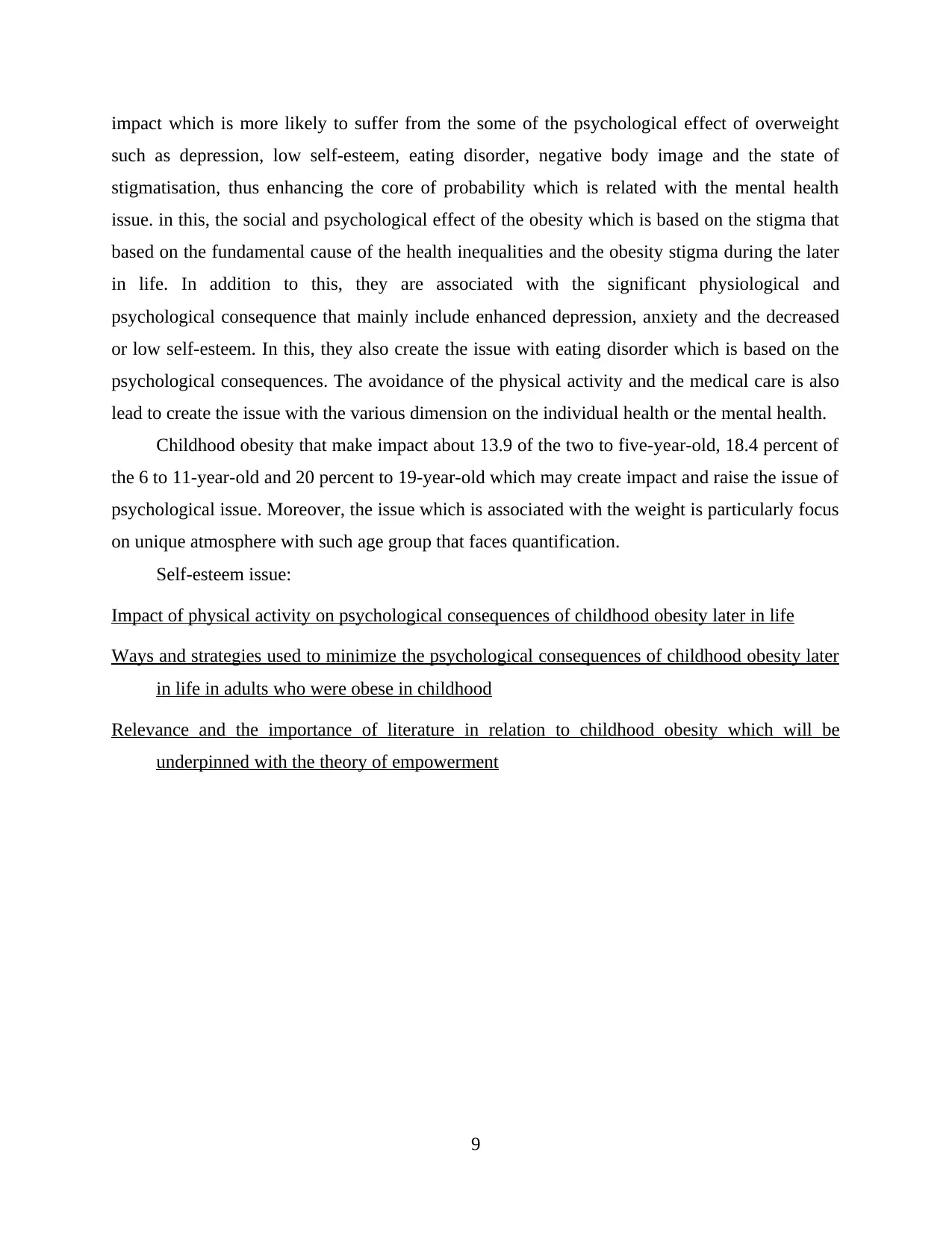
impact which is more likely to suffer from the some of the psychological effect of overweight
such as depression, low self-esteem, eating disorder, negative body image and the state of
stigmatisation, thus enhancing the core of probability which is related with the mental health
issue. in this, the social and psychological effect of the obesity which is based on the stigma that
based on the fundamental cause of the health inequalities and the obesity stigma during the later
in life. In addition to this, they are associated with the significant physiological and
psychological consequence that mainly include enhanced depression, anxiety and the decreased
or low self-esteem. In this, they also create the issue with eating disorder which is based on the
psychological consequences. The avoidance of the physical activity and the medical care is also
lead to create the issue with the various dimension on the individual health or the mental health.
Childhood obesity that make impact about 13.9 of the two to five-year-old, 18.4 percent of
the 6 to 11-year-old and 20 percent to 19-year-old which may create impact and raise the issue of
psychological issue. Moreover, the issue which is associated with the weight is particularly focus
on unique atmosphere with such age group that faces quantification.
Self-esteem issue:
Impact of physical activity on psychological consequences of childhood obesity later in life
Ways and strategies used to minimize the psychological consequences of childhood obesity later
in life in adults who were obese in childhood
Relevance and the importance of literature in relation to childhood obesity which will be
underpinned with the theory of empowerment
9
such as depression, low self-esteem, eating disorder, negative body image and the state of
stigmatisation, thus enhancing the core of probability which is related with the mental health
issue. in this, the social and psychological effect of the obesity which is based on the stigma that
based on the fundamental cause of the health inequalities and the obesity stigma during the later
in life. In addition to this, they are associated with the significant physiological and
psychological consequence that mainly include enhanced depression, anxiety and the decreased
or low self-esteem. In this, they also create the issue with eating disorder which is based on the
psychological consequences. The avoidance of the physical activity and the medical care is also
lead to create the issue with the various dimension on the individual health or the mental health.
Childhood obesity that make impact about 13.9 of the two to five-year-old, 18.4 percent of
the 6 to 11-year-old and 20 percent to 19-year-old which may create impact and raise the issue of
psychological issue. Moreover, the issue which is associated with the weight is particularly focus
on unique atmosphere with such age group that faces quantification.
Self-esteem issue:
Impact of physical activity on psychological consequences of childhood obesity later in life
Ways and strategies used to minimize the psychological consequences of childhood obesity later
in life in adults who were obese in childhood
Relevance and the importance of literature in relation to childhood obesity which will be
underpinned with the theory of empowerment
9

CHAPTER 4: DICSUSSION
10
10
⊘ This is a preview!⊘
Do you want full access?
Subscribe today to unlock all pages.

Trusted by 1+ million students worldwide
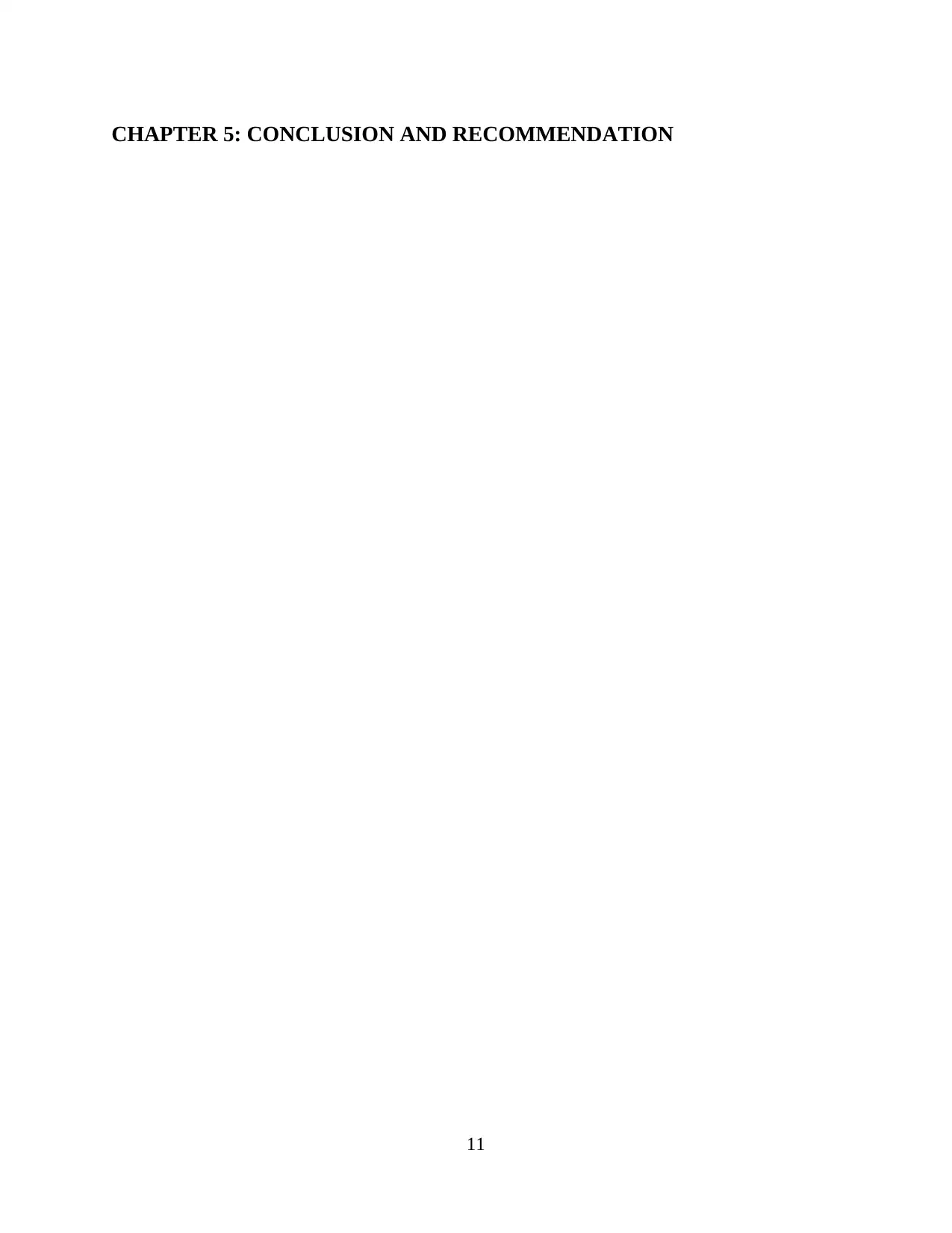
CHAPTER 5: CONCLUSION AND RECOMMENDATION
11
11
Paraphrase This Document
Need a fresh take? Get an instant paraphrase of this document with our AI Paraphraser
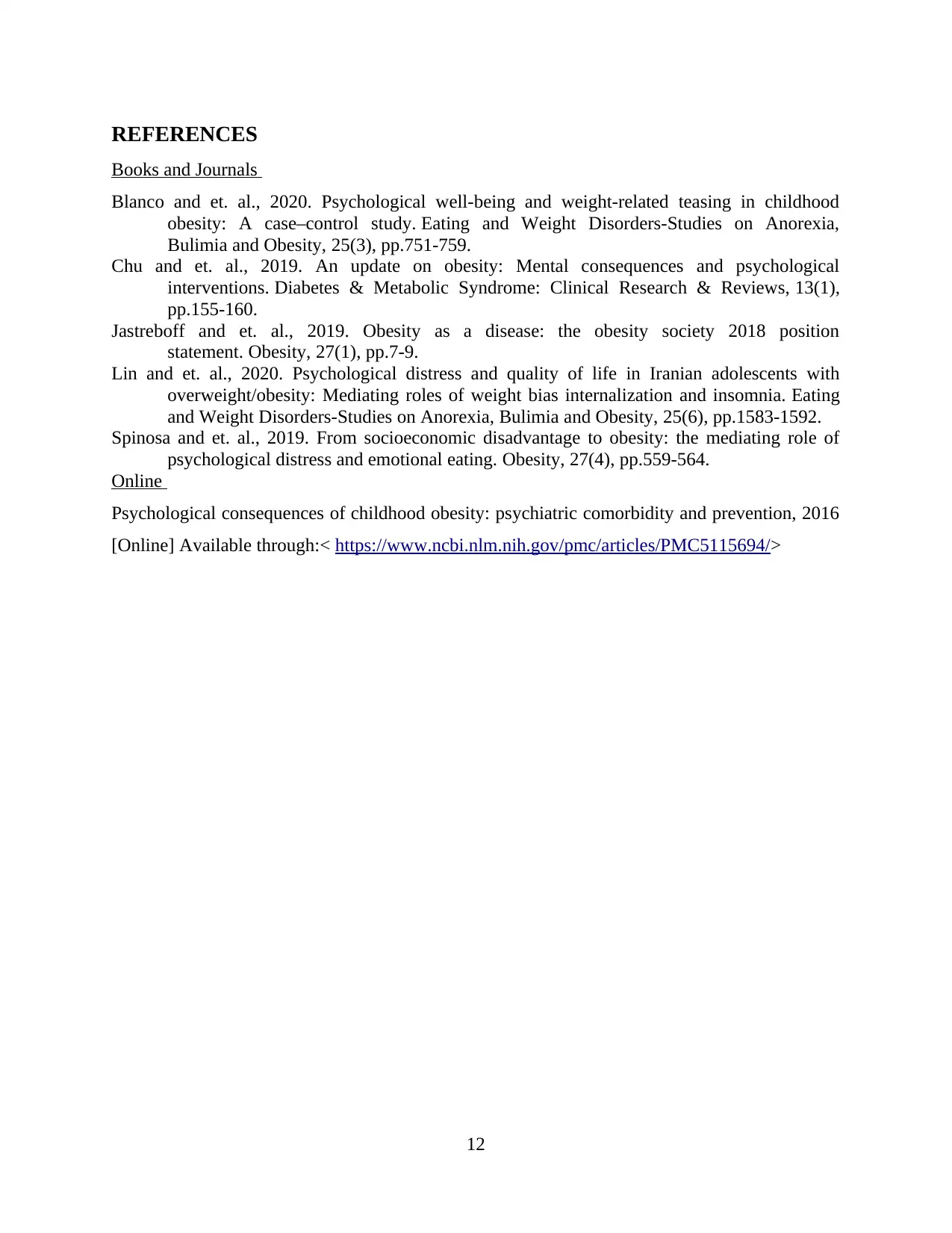
REFERENCES
Books and Journals
Blanco and et. al., 2020. Psychological well-being and weight-related teasing in childhood
obesity: A case–control study. Eating and Weight Disorders-Studies on Anorexia,
Bulimia and Obesity, 25(3), pp.751-759.
Chu and et. al., 2019. An update on obesity: Mental consequences and psychological
interventions. Diabetes & Metabolic Syndrome: Clinical Research & Reviews, 13(1),
pp.155-160.
Jastreboff and et. al., 2019. Obesity as a disease: the obesity society 2018 position
statement. Obesity, 27(1), pp.7-9.
Lin and et. al., 2020. Psychological distress and quality of life in Iranian adolescents with
overweight/obesity: Mediating roles of weight bias internalization and insomnia. Eating
and Weight Disorders-Studies on Anorexia, Bulimia and Obesity, 25(6), pp.1583-1592.
Spinosa and et. al., 2019. From socioeconomic disadvantage to obesity: the mediating role of
psychological distress and emotional eating. Obesity, 27(4), pp.559-564.
Online
Psychological consequences of childhood obesity: psychiatric comorbidity and prevention, 2016
[Online] Available through:< https://www.ncbi.nlm.nih.gov/pmc/articles/PMC5115694/>
12
Books and Journals
Blanco and et. al., 2020. Psychological well-being and weight-related teasing in childhood
obesity: A case–control study. Eating and Weight Disorders-Studies on Anorexia,
Bulimia and Obesity, 25(3), pp.751-759.
Chu and et. al., 2019. An update on obesity: Mental consequences and psychological
interventions. Diabetes & Metabolic Syndrome: Clinical Research & Reviews, 13(1),
pp.155-160.
Jastreboff and et. al., 2019. Obesity as a disease: the obesity society 2018 position
statement. Obesity, 27(1), pp.7-9.
Lin and et. al., 2020. Psychological distress and quality of life in Iranian adolescents with
overweight/obesity: Mediating roles of weight bias internalization and insomnia. Eating
and Weight Disorders-Studies on Anorexia, Bulimia and Obesity, 25(6), pp.1583-1592.
Spinosa and et. al., 2019. From socioeconomic disadvantage to obesity: the mediating role of
psychological distress and emotional eating. Obesity, 27(4), pp.559-564.
Online
Psychological consequences of childhood obesity: psychiatric comorbidity and prevention, 2016
[Online] Available through:< https://www.ncbi.nlm.nih.gov/pmc/articles/PMC5115694/>
12
1 out of 14
Related Documents
Your All-in-One AI-Powered Toolkit for Academic Success.
+13062052269
info@desklib.com
Available 24*7 on WhatsApp / Email
![[object Object]](/_next/static/media/star-bottom.7253800d.svg)
Unlock your academic potential
© 2024 | Zucol Services PVT LTD | All rights reserved.





